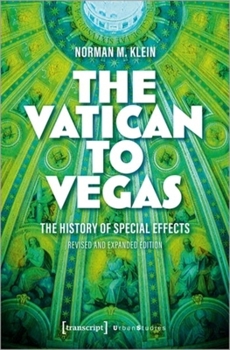The Vatican to Vegas: The History of Special Effects
Select Format
Select Condition 
Book Overview
A guided tour through the nuanced politics of architectural illusion, The Vatican to Vegas takes the reader from lavish Baroque fantasies of the seventeenth century to the Electronic Baroque of today. The >scripted spacesscripted spaces
Format:Paperback
Language:English
ISBN:3837661695
ISBN13:9783837661699
Release Date:March 2025
Publisher:Transcript Publishing
Length:520 Pages
Customer Reviews
3 ratings
A great literary stylist delivers a great book
Published by Thriftbooks.com User , 18 years ago
I am shocked at the ignorance of the last reviewer. Norman Klein is one of the finest literary stylists in the English-speaking world. He is a novelist as well as a critic. I have followed his work carefully for many years. Probably no one but he could have delivered this level of scholarship in the spirit of a novel, with ironic essays woven even into the footnotes, with a structure that says the book itself is a Renaissance computer. He is also famous for his lectures in Europe and the US, in a spirit that definitely does not make him simply a professor in the dull sense, not at all. He is a man of letters, and a public intellectual of the first order. This is a major book that already has been studied carefully in Europe, already has a complex, respectful literary answer published in Spain (in English, by working architects, not professors). Klein's work also has been used by animators at Disney, at The Simpsons. He helped train various animators with shows on Nikolodeon. There have been conferences based on his theories that drew visitors and speakers from across the arts. To repeat, he teaches and trains people in the arts and architecture. It is truly shocking that people simply do not read enough, or carefully enough, to realize what is not traditional scholarship. This is utterly fresh,indeed a new direction in literature itself, by a man who writes across borders and forms.
How to Write History
Published by Thriftbooks.com User , 19 years ago
Belles Lettres as they too rarely come. Vatican to Vegas is like a key to the secret history of our times. Klein is proving himself one of our finest, most demanding, readable and original writers. As a historian and cultural critic, Klein stands alone in his ability and will to cross academic categorizations. While his first two books constitute masterpieces within relatively close-focussed historical genres, Vatican to Vegas, in fact, categorizes itself as something larger, a book -- a ?Renaissance computer", able to link the odd, inter-disciplinary traces of its elusive but all-pervasive subject into the histories of technology, of the carnival, of art, of literature, of Western culture itself. It opens up the color and intensity of marginal histories, turning the 19th century novel of Zola and Balzac into the sort of book it never quite managed to form in the 20th. We encounter socialist industrial history, Freudian self-consciousness, pop culture, anecdotal reminiscence. We achieve rich and total immersion in what remains Klein's constant theme -- the relation of illusion to the real, and the power this dialectic generates in the real, political world. One of the best, most important books of the year.
an ingenious, original, useful, groundbreaking work
Published by Thriftbooks.com User , 19 years ago
Not only students and scholars of the history of art, architecture, film, animation, western culture can rejoice at the publication of Norman Klein's epic and illuminating history of special effects illusionism, from the 17th century to the present. This book also promises delight to the common reader interested and engaged with the peculiar culture our times. As spectacle morphs to ever stranger forms, Klein offers an invaluable set of tools for analyzing, understanding, critiquing and surviving its massive leveling wash.Klein's thesis, that large-scale special effects consistently function within a dialectic of political power and powerlessness, not only newly opens important influential fields for his spectacular research and interdisciplinary penetrations, but delights, in a rich and novelistic narrative,sparkling with brilliant characters (Ben Jonson, Mary Shelley, Edgar A. Poe, Charles Babbage, Jules Verne, George W. Bush) and bubbling over with cascading, interconnected information. The writer also lays bare his own private history, how special effects intervened in his Coney Island Youth and his Los Angeles adulthood, as a useful, literary casestudy. Special Effects emerges not simply as a hegemonic tool of repression but as a perplexing and evolving field of invention, influence and ambitious expression still as liable to charm as depress. In particular, Klein's research on the history of technology was of particular use and interest to me. But the book serves happily, with its brilliantly organized index and "search engine" as a hand-book of effects history and theory in all disciplines. Klein crosses boudaries between history, theory, sociology and literature, offering important new realizations without ever overlooking, or short-shrifting the achievements of scholars dedicated to those particular fields. Vatican to Vegas, indeed, offers a brilliant example of the promise that interdisciplinary engagement offers writers of the future. I haven't read Klein before, but I'm telling you, I'll start now.I won't start praising the pictures, though they're fascinating.Buy this book and nail it to your desk or bedside table. In our current "Electronic Baroque" (a key Kleinian term), it grows more and more relevant every day.




